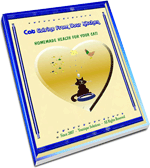Posts Tagged ‘Worms Treatment’
 Can We Get Worms from our Pets?
Can We Get Worms from our Pets?
Worms Treatment – for Us!
Can we get worms passed to us from our pets?
Hookworms and roundworms = YES. It is possible.
Certain activities make us more prone to exposure — if we’re not careful to follow simple hygiene.
Do you worship the sun as a Sunbather?
Lie in the grass or beach where animals may have toileted?
There could be hookworms lurking.
Work in the garden, digging in the soil? – Same thing.
Have pets, kids and a sandbox? – Ditto
Have pets that sojourn in your garden? – Copy the above.
But don’t panic. With simple, good hygiene …that you likely practice any way, you should have no problem.
How Does Transmission Happen?
Roundworms
You can become infected with roundworm by ingesting eggs found in soil that has been contaminated with cat (or dog) feces. Unless you are prone to eating dirt, the chance for infestation is smaller. But the eggs are sticky and can adhere to other objects as well, thus transferring easily to our hands.
Roundworms find places where dogs or cats toilet to be ideal home bases and can take up residence in large numbers. We can get distracted, stick our fingers in our mouth after handling something that was in the dirt, play in the soil or garden and unknowingly put our fingers in our mouth to pick at our teeth or brush away something that may have flown into our mouths. Or maybe to scratch our tongue? (I’ve never had an itchy tongue…but hey…it’s possible! Have you ever tried to dig up something difficult in the garden, mouth askew from grunting and concentrating, and have something fly in?…….  ) Or how about wetting our finger to wipe off the dust from an object we’re using … and other crazy examples…
) Or how about wetting our finger to wipe off the dust from an object we’re using … and other crazy examples…
 Kids, unfortunately, always seem to have their fingers in their mouth …as well as other orifices, so they are far more likely to contract roundworm. Thus, another important reason to teach excellent sanitation from a very young age.
Kids, unfortunately, always seem to have their fingers in their mouth …as well as other orifices, so they are far more likely to contract roundworm. Thus, another important reason to teach excellent sanitation from a very young age.
Unfortunately infestation does happen. Around 10,000 instances of roundworm infestation have been reported in the US in one year. Many different organs can be affected by the migrating larvae through the body tissues with some serious consequences, and children, especially, being smaller and with less developed systems in general, can be saddled with repercussions of the eggs remaining able to infect for years down the road.
Hookworms
Hookworms are transmitted to people via the skin and migrate through the body. The hookworm larvae live in the ground and come into contact with human skin when it is exposed and in contact for long time periods with the ground, inhabiting especially wet sand or dirt. Some examples of those most at risk: electricians, gardeners, plumbers and sunbathers.

You needn’t be unduly afraid of cuddling your cat or dog, as direct contact in general doesn’t transmit the eggs or larvae. The eggs of both roundworms and hookworms, as well as hookworm larvae, need to be established in the site around two weeks before they are able to infect.
However, if you have puppies , note that they will use their litter/toilet area often and repeatedly, contaminating it should they have the worms. Anyone handling the pups and/or the mother needs to be especially careful and mindful of excellent hygiene.
Quick Prevention Tips
- Be mindful that animals may have used a sandbox as a toilet. Take steps to keep your child’s sandbox covered and be mindful when working in the garden, that this area, too, is a preferred toilet oasis. Keep your pets wormed.
- Wash those ‘paws’ of yours…and pay attention to scrub well under the fingernails! Those eggs are sticky!
- Wash well with lathered soap for a full 20 seconds minimum (sing the Alphabet song, “Happy Birthday to You” (twice) or “Twinkle, Twinkle Little Star” to yourself to time it.)
- Teach your kids to do the same..and keep fingers out of the mouth and away from their face when playing outside or with the pets. Be sure they wash their hands as soon as they come indoors after playing, after playing with the pets and always before eating…. and supervise that it is done correctly…and you’ll both likely share a lifetime sans the wrigglers!












